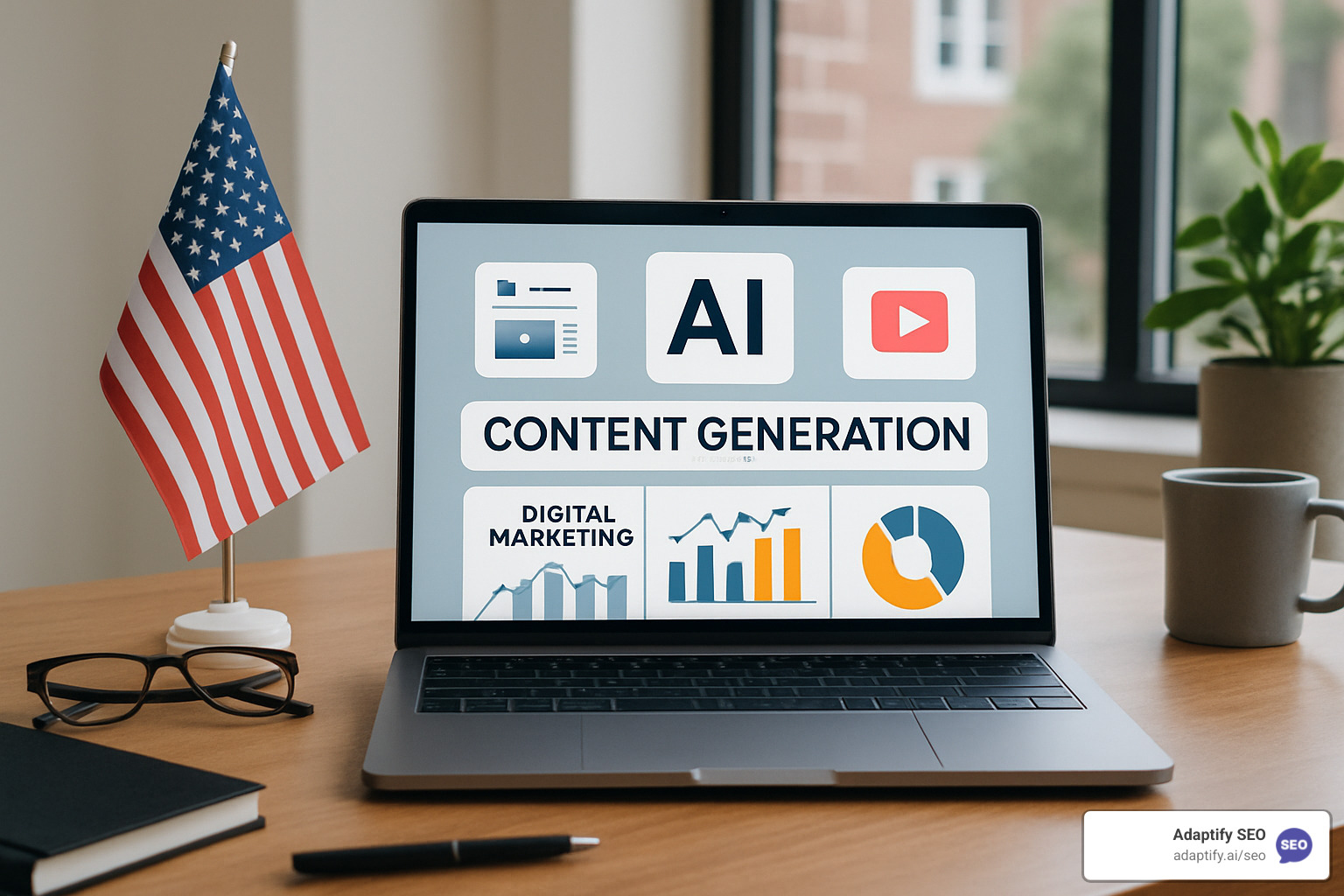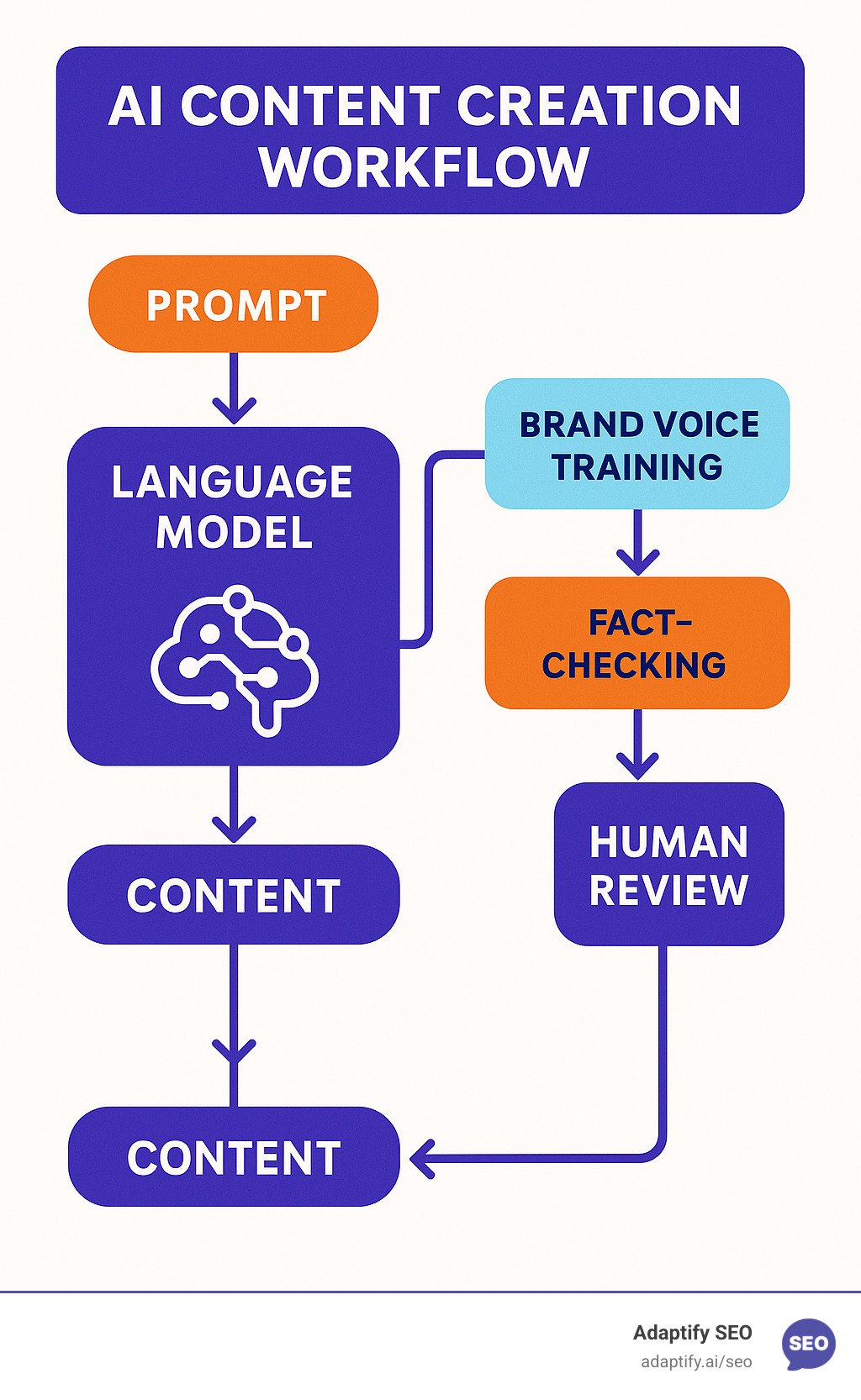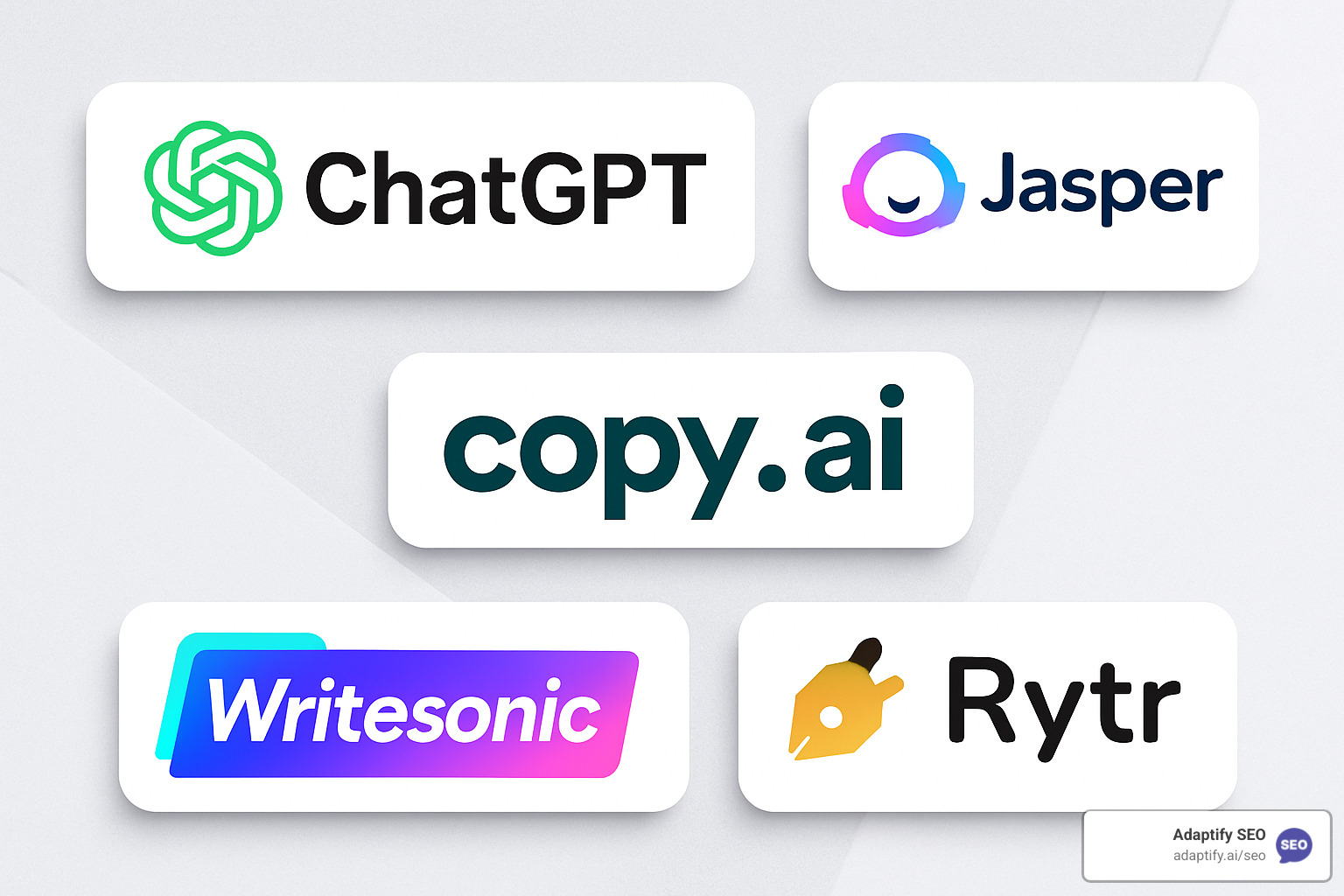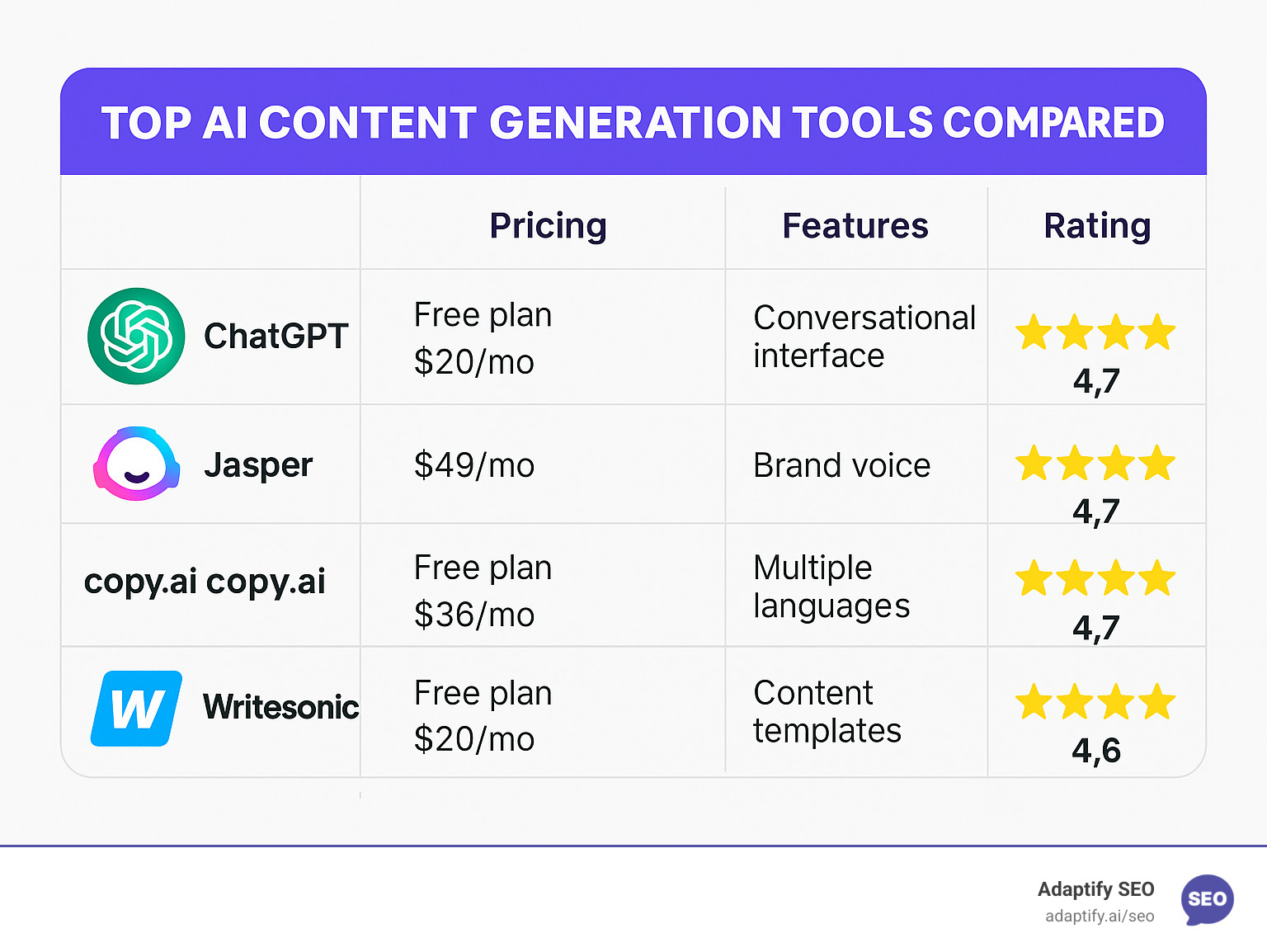AI Content Generator Tools to Make Your Life Easier
Hansjan Kamerling
Jul 1
Why AI Content Generation Tools Are Revolutionizing Marketing

AI content generation tools are software platforms that use artificial intelligence to automatically create written content, images, videos, and other marketing materials. These tools help businesses produce content faster, cheaper, and at scale compared to traditional manual methods.
Top AI Content Generation Tools:
- ChatGPT - Best for general writing and ideation (200+ million users)
- Jasper - Best for business marketing with brand voice training
- Copy.ai - Best for advertising copy and social media
- Writesonic - Best for SEO-optimized content creation
- Rytr - Best budget option with free tier (10k characters/month)
- Gemini - Best for real-time data integration
- Grammarly - Best for editing and grammar checking
The numbers tell the story. ChatGPT reached 200 million users by October 2024, making it the world's most popular AI application. Meanwhile, 75% of marketers now use AI tools to some degree, with 19% of businesses actively generating content with AI.
The impact is dramatic. What used to take 4 hours to write manually can now be done in minutes. Companies report cutting content costs by 70% while boosting productivity by 10%.
Most AI tools use the same underlying language models (95% rely on OpenAI or Claude APIs), so the real difference lies in their features, integrations, and ease of use.
I'm Hansjan Kamerling, and I've spent years helping AI startups design and launch content platforms, including working with a data analytics platform that serves 40,000+ users with custom-trained AI models.

What Are AI Content Generation Tools?
AI content generation tools are sophisticated software that can write like humans - but much faster. These platforms use large language models (LLMs) to create everything from blog posts to social media captions.
The big names include GPT-4o (which powers ChatGPT), Claude, and Gemini. These models learned to write by reading massive amounts of text from sources like Common Crawl, which contains billions of web pages.
These tools are essentially very smart autocomplete systems. They look at your prompt and predict what words should come next, keeping track of context across thousands of words (roughly 750 words per 1,000 "tokens" in AI speak).
How They Work: LLMs & Prompting
The magic happens through next-word prediction. When you type "Write a blog post about sustainable marketing," the AI uses patterns from millions of examples to figure out what words typically follow that kind of request.
Modern ai content generation tools have gotten smarter with three key improvements. RAG (Retrieval Augmented Generation) lets them pull fresh information from the web. Prompt engineering uses carefully crafted templates that guide the AI toward better results. And fine-tuning trains the models on specific types of content.
Main Use Cases & Benefits
Blog drafting used to mean staring at a blank page for hours. Now writers use AI to generate outlines, write first drafts, and brainstorm ideas. That typical 4-hour blog post? It's down to 20-30 minutes of AI drafting plus human editing time.
Social media is where AI really shines. Instead of manually writing each post, marketing teams generate dozens of variations in minutes. Teams go from 5-10 posts per week to 50+ with the same staff.
Ad creative gets interesting when you need to test multiple versions. Tools like Anyword can create dozens of ad variations and predict which ones will perform better.
Localization becomes affordable when AI handles the heavy lifting. Adapting content for different markets used to require hiring multiple writers. Now it's a matter of adjusting prompts.
A 1,500-word article that costs $175 to outsource can be generated for pennies with AI. But the real win isn't just saving money - it's the speed and ability to try multiple approaches without breaking the budget.
Limitations, Risks & Ethical Considerations
Here's something most AI tool vendors won't tell you: these ai content generation tools come with serious baggage that could bite your business if you're not careful.
Hallucinations are the biggest headache. AI models don't just make mistakes - they confidently lie with a straight face. I've watched tools generate completely fictional statistics, invent case studies that never happened, and cite research papers that don't exist. The scary part? It all looks perfectly legitimate until you fact-check it.
Bias runs deep in these systems. Since AI models learn from internet content, they absorb all the biases and stereotypes that exist online. The Harvard review of bad poems shows how AI can produce content that's technically correct but completely tone-deaf.
I've seen AI tools default to male pronouns for executives and female pronouns for assistants, suggest culturally inappropriate marketing approaches, and exclude entire demographics from their suggestions.
Copyright lawsuits are piling up fast. Major publishers and writers are suing AI companies for training models on copyrighted content without permission. While these cases are still working through the courts, businesses using AI-generated content could face legal challenges.
Data privacy is equally concerning. Many ai content generation tools store your prompts and outputs, potentially exposing sensitive business information. Always check privacy policies before feeding confidential data into these systems.
Brand voice drift might be the most subtle danger. When you rely heavily on AI, your content gradually starts sounding like everyone else's. The unique personality that makes your brand memorable gets smoothed out into generic prose.
AI detection tools are getting smarter too. While Google claims they don't automatically penalize AI content, they do reward original, helpful content with unique insights. If your AI-generated content lacks that human spark of genuine expertise, it's going to struggle in search rankings.
The bottom line? These tools are incredibly powerful when used right, but they need human oversight, fact-checking, and creative direction to produce content that actually serves your business goals.
Top AI Content Generation Tools Compared

After testing dozens of ai content generation tools, I can tell you the market has clear winners - and a few surprising disappointments. While most platforms use similar underlying AI models, the differences in features, pricing, and user experience are dramatic.
Jasper, Copy.ai, Writesonic, and Rytr all maintain impressive 4.7 out of 5 star ratings on G2. But Clearscope takes the crown with 4.9 stars, though it serves a different purpose than pure content generation.
Pricing models vary wildly. Some charge per word, others offer unlimited plans, and a few use credit systems that can get expensive fast.

ChatGPT & Gemini
ChatGPT is the elephant in the room with 200 million users. The free tier handles most basic content needs surprisingly well. At $20 monthly for ChatGPT Plus, you get faster responses and priority access during peak times.
What makes ChatGPT special is the conversation. You can iterate on content naturally, asking for changes like "make this more casual" or "add more data points." 68.7% of SEO professionals rated ChatGPT as their most reliable AI model in a recent Clearscope survey.
Gemini plays catch-up in most areas, with only 9.9% of that same survey preferring it over ChatGPT. But it has one killer feature: real-time web access. While ChatGPT's knowledge has a cutoff date, Gemini can pull current information and verify facts against live sources.
Jasper & Copy.ai
Jasper positions itself as the grown-up choice for serious marketing teams. Starting at $49 monthly for creator features and jumping to $69 for advanced brand voice capabilities, it's not the budget option.
But here's why teams swear by it: Jasper learns your specific voice and style when you upload existing content. The new agentic workflows can handle entire content campaigns with minimal babysitting.
Copy.ai takes a different angle, focusing heavily on ad templates and social media copy. Their workflow system excels at creating coordinated campaigns across multiple platforms. The Chrome extension is surprisingly handy.
Writesonic & Rytr
Writesonic caught my attention with its SEO checker integration. It connects directly with Ahrefs and SEMrush to pull real keyword data and optimize content for search.
The plagiarism tools are built-in, which saves time and subscription fees. Credit-based pricing can get confusing, but their unlimited plan offers solid value for high-volume users.
Rytr is the scrappy underdog with budget plans that actually work. The free tier gives you 10,000 characters monthly, and unlimited usage costs just $9. The content quality rivals much more expensive tools.
Article Forge, Frase & Clearscope
Article Forge promises true SEO automation but delivers mixed results. It can research topics and create factually accurate articles, but the output often lacks unique insights.
Frase combines generation with content research. It analyzes top-ranking pages for your keywords and suggests structures based on what's already working.
Clearscope plays a different game entirely. Instead of generating content from scratch, it focuses on optimization with SERP scores for existing content. With that 4.9 G2 rating, it's the highest-rated tool in this space.
Anyword & Peppertype
Anyword brings performance prediction to content generation. It doesn't just create copy - it predicts how well that copy will perform based on historical data.
Peppertype offers both AI tools and access to a creator marketplace. This hybrid approach works well when you want AI efficiency with human oversight options.
How to Evaluate & Integrate AI Content Generators Into Your Workflow

Here's the truth about implementing ai content generation tools: the wrong choice can waste months of your team's time and thousands of dollars. I've watched companies jump on the AI bandwagon only to abandon their tools after a few frustrating weeks.
The key isn't finding the "best" tool - it's finding the right tool for your specific workflow, team, and goals. After helping dozens of agencies and businesses integrate AI into their content operations, I've learned that success comes down to three factors: careful evaluation, smart integration, and realistic expectations.
Selection Criteria Checklist
Think of choosing an AI content tool like hiring a new team member. You wouldn't hire someone without checking their skills, reliability, and how well they'd fit with your existing team. The same logic applies here.
LLM quality should be your first consideration. Spend time testing the same prompts across different platforms. I recommend creating a set of 5-10 test prompts that represent your typical content needs. Run these through each tool you're considering and compare the results. Look for coherent responses that stay on topic and maintain a consistent tone throughout.
Compliance and security become critical if you're handling client data or sensitive information. Don't assume all platforms are created equal here. Look for SOC 2 Type II compliance, GDPR adherence, and zero-retention policies that prevent your data from being used to train public models. Enterprise-grade security isn't just nice to have - it's essential for protecting your business and clients.
Integration capabilities can make or break your implementation. The best AI tool in the world is useless if it doesn't play well with your existing systems. Check for native integrations with your CMS, social media management tools, and marketing automation platforms. WordPress plugins, Zapier connections, and API access can dramatically streamline your workflow.
User experience matters more than you might think. I've seen teams abandon powerful tools simply because they were too complicated to use daily. Test the interface thoroughly. Can new team members figure it out quickly? Is the learning curve reasonable? A slightly less powerful tool that your team actually uses will always outperform a feature-rich platform that sits unused.
Support quality becomes crucial when things go wrong. Test the customer service before you commit. How quickly do they respond? Is their knowledge base comprehensive? Active user communities can be invaluable for troubleshooting and sharing best practices.
Integration Tips & Best Practices
The biggest mistake I see companies make is treating AI tools like magic wands. They sign up, start generating content, and wonder why the results feel generic or off-brand. Successful integration requires intentional planning and clear processes.
Brand guidelines are non-negotiable. Before you generate a single piece of content, document your brand voice, tone, and style preferences. Most ai content generation tools allow you to create custom instructions that guide output toward your brand standards. Spend time crafting these guidelines - they'll save you hours of editing later.
Human oversight should be built into every workflow. I can't stress this enough: never publish AI-generated content without human review. Establish clear processes that include fact-checking, brand alignment verification, and quality assessment. The goal isn't to eliminate human involvement - it's to make human work more strategic and valuable.
CMS plugins and Zapier integrations can streamline your workflow, but use them carefully. I've seen businesses accidentally publish low-quality content because they over-automated their processes. Start with manual workflows and gradually add automation as you refine your quality standards.
Prompt engineering training is one of the best investments you can make. The quality of AI output is directly related to the quality of your prompts. Teach your team how to write effective prompts that generate better results. This skill alone can dramatically improve your content quality and reduce editing time.
SEO & Search Intent Handling
This is where ai content generation tools can really shine, but only if you approach SEO strategically rather than just stuffing keywords everywhere.
Keyword research integration works best when it's seamless. Tools like Writesonic and Frase can pull keyword data directly from platforms like Ahrefs and SEMrush, ensuring your content targets relevant search terms. But remember - keyword optimization should improve readability, not override it. Content that reads naturally while incorporating target keywords will always outperform keyword-stuffed articles.
Content scoring features help ensure your content meets SEO best practices without requiring deep technical knowledge. Clearscope's approach of analyzing top-ranking competitors and providing specific optimization recommendations is particularly effective. These tools can identify gaps in your content and suggest improvements that actually move the needle.
Meta description and title generation might seem like a small feature, but it saves significant time. Most platforms can generate multiple variations of titles and meta descriptions based on your content. I still recommend human review to ensure they accurately represent your content and include compelling calls-to-action.
Structured data and formatting often get overlooked in the rush to create content. AI tools can help ensure your content includes proper heading structures, internal linking opportunities, and other technical SEO elements that improve search performance. The key is setting up templates and guidelines that make these optimizations automatic rather than afterthoughts.
Future Trends & Real-World Case Studies
The ai content generation tools landscape is changing faster than most people realize, and I'm seeing fascinating developments that will reshape how we create content.
Multimodal AI capabilities are quickly expanding beyond simple text generation. The most innovative companies are already creating complete marketing campaigns using integrated AI platforms. They start with a blog post, then automatically generate matching social media graphics, video scripts, and even audio content - all from a single prompt.
Autonomous agents represent the next major leap forward. Instead of asking AI to write one blog post, these systems can manage your entire content calendar. They analyze performance data, identify content gaps, create new pieces, schedule publication, and optimize based on engagement metrics.
The rise of open-source LLMs like DeepSeek is democratizing AI technology. These models perform nearly as well as expensive proprietary alternatives but cost a fraction of the price. This means smaller businesses can access the same AI capabilities that were previously only available to enterprise companies.
Regulatory developments are starting to catch up with the technology. The EU's AI Act and similar legislation will require businesses to be more transparent about when and how they use AI-generated content.
Enterprise adoption is accelerating as companies see real, measurable results. One e-commerce client was spending weeks creating product descriptions for new inventory. After implementing AI content tools, they reduced that timeline to just hours while maintaining quality standards.
Another marketing agency tripled their content output without hiring additional writers. They used AI to handle first drafts and research, while their human team focused on editing, strategy, and client relationships.
Companies using ai content generation tools report an average 10% increase in marketer productivity, which translates to an estimated $463 billion in annual savings across the entire industry.
We're still in the early days. The AI tools available today will seem primitive compared to what's coming in the next few years. The companies that start experimenting now will have a massive advantage over those who wait.
Frequently Asked Questions about AI Content Generation
Are AI generators replacing human writers?
AI isn't replacing human writers - it's changing what they do. The writers who thrive are the ones who accept ai content generation tools as creative partners rather than threats. They use AI to handle the tedious first-draft work and spend their time on what humans do best: strategic thinking, creative problem-solving, and adding unique insights.
Think about calculators and mathematicians. Calculators didn't put mathematicians out of work - they freed them up to tackle more complex problems instead of spending hours on basic arithmetic.
The most successful content teams follow a hybrid approach. AI handles research, outlines, and first drafts. Humans focus on strategy, brand voice, fact-checking, and adding personal insights that make content truly valuable.
How do these tools protect my data?
Data protection varies dramatically across these tools, and it's something you need to pay close attention to.
Enterprise-grade platforms like Jasper and Writer take security seriously. They offer zero-retention policies, meaning your prompts and content don't get fed back into their training data. They also use military-grade encryption - TLS 1.3 for data in transit and AES-256 for data at rest.
Free tools like ChatGPT may use your inputs to improve their models unless you specifically opt out in your settings. I've seen businesses accidentally share confidential information through free AI tools without realizing it could be used for training.
Read the privacy policies carefully. If you're handling sensitive client data, competitive information, or proprietary content, invest in enterprise plans with proper data protection guarantees.
What's the average cost of top platforms?
Pricing for ai content generation tools varies dramatically, and the "best" option depends entirely on your needs and budget.
Free tiers can be surprisingly capable. ChatGPT's free version, Gemini, and Rytr's free plan (10,000 characters monthly) are perfect for testing or light content needs.
For budget-conscious users, Rytr's unlimited plan at $9 per month offers incredible value, while ChatGPT Plus at $20 monthly provides faster responses and priority access.
Professional marketers typically gravitate toward mid-tier options. Jasper starts at $49 monthly for creator features and jumps to $69 for advanced brand voice capabilities. Copy.ai's business plan also runs $49 monthly.
Enterprise solutions get into custom pricing territory, usually starting around $100+ monthly with advanced collaboration features, improved security, and dedicated support.
Start with free trials. Most platforms offer 7-14 day trials with full feature access. Test your actual use cases and see which interface feels natural to your team.
Conclusion
The world of ai content generation tools has matured far beyond the early days of clunky chatbots and generic text spinners. What we have today are sophisticated platforms that can genuinely transform how businesses create content - if you know how to use them right.
Here's the reality: these tools aren't magic. They still hallucinate facts, sometimes sound robotic, and can't replace the strategic thinking that makes content truly valuable. But when you combine AI efficiency with human creativity and oversight, something powerful happens. You get the best of both worlds - the speed and scale of automation with the insight and quality control that only humans can provide.
I've watched companies cut their content costs by 70% while actually improving quality because they freed up their writers to focus on strategy, editing, and adding unique insights rather than grinding out first drafts. That's the hybrid approach that actually works.
The businesses thriving with AI aren't the ones trying to replace their entire content team with robots. They're the smart ones using ai content generation tools to handle the heavy lifting so their humans can do what humans do best - think strategically, add personal experience, and ensure everything aligns with brand goals.
At Adaptify SEO, we've built our entire approach around this philosophy. Our automated SEO services don't just throw AI at your content problems and hope for the best. We combine intelligent automation with proven SEO strategies to create content that actually ranks and converts. It's AI working alongside human expertise, not instead of it.
The technology will keep evolving - that's guaranteed. But the fundamental principle won't change: the most successful content strategies will always blend AI efficiency with human wisdom. Start there, implement proper safeguards, and be ready to adapt as new capabilities emerge.
Ready to see how this hybrid approach can transform your content strategy? Book a Demo to find how Adaptify's automated SEO services can streamline your content creation while maintaining the quality and strategic focus that drives real results.

